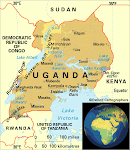During the spring of 1994, I had just turned three. My sister, Britta, was my best friend (and I am lucky enough to still consider her among those closest to me). I lived in Cortland, OH and had already started pre-school. My mother and father were beginning to realize that the next several years would be spent catering to a picky eater who could hardly stay seated at the table. At three years old, I had little a care other than perhaps my bedtime and wishing I had McDonalds on my plate instead of the bland concoctions my mother liked to call food.
That was my spring of 1994. Meanwhile, in Rwanda, close to a million people were killed in 100 days. During the massive bloodbath, the international community failed to provide any meaningful assistance in what they referred to as “acts of genocide.” Children the very same age as me whose best friends were their sisters and brothers were being bludgeoned to death, smashed against walls, or hacked to pieces by machetes. Their last words were, “UNAMIR will come” and “Mom, were can I run to?” Parents could provide little comfort since they too were manically massacred with machetes, raped, buried alive, or thrown into latrines and then stoned until the screams ceased. Safe havens such as churches were hardly secure. Priests would sell out their own congregations exposing their followers to some of the cruelest deaths imaginable.
I was startled when I got to Rwanda this weekend. The Western influence in Kigali, Rwanda’s capital, was overwhelming. Buses that leave on time, drainage systems, no littering, and hamburgers? I sure wasn’t in Uganda anymore. The Western influence is, in large part, a product of the guilt money Europe and the USA has poured in after failing to aid Rwanda during its darkest hour. Up until a few years ago, I had never heard of the Rwandan Genocide. This weekend though, I visited Des Mille Collines, the hotel that the movie Hotel Rwanda is based of off and went to the Genocide memorial. I understand that often times, we try to forget the worst parts of history. Who wants to dwell on the evil that humans are capable of committing? However, I wish I had learned about this genocide sooner. I wish I knew more about the genocides that have occurred in the past: the Balkans, the Holocaust, Armenia, and Cambodia. It is too easy for people to forget it is humans that are capable of the very worst atrocities and the most compelling compassions.
The conflict between the Tutsi and Hutu people was fueled originally by colonization. Initially, Tutsi and Hutu were names for economic standing. However, colonizers took the labels and applied them to ethnic groups. The Europeans would measure noses in order to distinguish Tutsi from Hutu. If you had ten cows or more, you were automatically Tutsi as were all your decedents thereafter. During the beginning of colonization, the Tutsi minority was given the power in the government; but when independence came, Hutus were put into power. Resentment from years of oppression led to the beginnings of violent conflict between the Tutsi and Hutu. Tutsi began to leave the country for refugee camps in bordering nations. However, they would reinvade the country periodically in attempt to reestablish their part of Rwandan society. Aided by media, the Interahamwe, extremist Hutus, began to circulate that Rwanda would be much better off without the Tutsi “cockroaches.” Massacres continually took place in the years leading up to 1994. However, it wasn’t until Prime Minister’s plane was shot down on April 6, 1994 that the full out genocide began.
Today, bodies are still turning up, many of them unidentifiable. People are still displaced in refugee camps. Teachers are largely unqualified because so many of those who were didn’t make it through spring 1994. Orphans head households. Women suffer from the HIV they contracted while being mercilessly raped. The ramifications of the Rwandan Genocide are still coursing though the nation. But as an outsider just spending a few days in the capital, the brutal past was easy to miss unless you looked for it. The countryside I drove through was breathtaking. Hills and valleys filled with people laboring in fields. Huts nuzzled into hillsides. I kept trying to picture the streets and valleys littered with bodies. I tried to imagine extremists carrying bloodied machetes to these peaceful homes. The church I attended on Sunday was one of the churches that gave up its congregation to the Interahamwe; I tried to feel the fear that once consumed its walls. But try as I might, I will never be able to fully comprehend the pain nor the horror of that spring. Maybe that is part of the reason humans are doomed to repeat history. Even those who try to comprehend never entirely will. We cannot feel what others feel unless we ourselves experience it. But I can’t help but think that we would repeat a little less if more people wanted to understand and empathize.
Thursday, July 8, 2010
Subscribe to:
Post Comments (Atom)

.jpg.gif)
Hi Hal,
ReplyDeleteIt's a good thing that you are there, in uganda and visiting rwanda. Even though you are one person. Your compassion for the people who suffer is going to help the world. I know you'll have a big impact on all the people you meet. And the fact that you can share these experiences with us, now and with others in the future will continue to make powerful differences.
I'm so glad your experience is turning out to be rewarding despite all your illnesses.
You're awesome.
<3 lexi